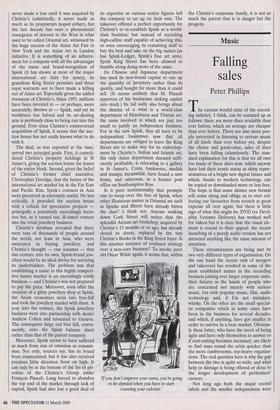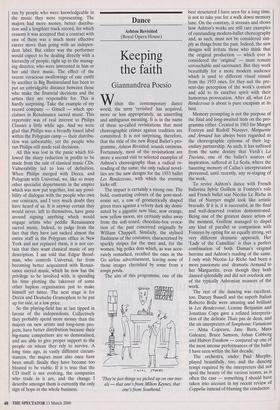Music
Falling sales
Peter Phillips
The current woeful state of the record- ing industry, I think, can be summed up as follows: there are more discs available than ever before, which on average are cheaper than ever before. There are also more peo- ple interested in listening to serious music of all kinds than ever before yet, despite the choice and good-value, sales of discs have been falling calamitously. The stan- dard explanation for this is that we all own too many of these discs now, which anyway have lost their iconic status as shiny repre- stntatives of a bright new digital future and which, thanks to modern technology, can be copied or downloaded more or less free. The hope is that some shinier new format will come along and oblige us to start col- lecting our favourites from scratch at great expense all over again, but there is little sign of what this might be. DVD (or Devil- ishly Verismo Delivery) has worked well for videos but it is clear that the visual ele- ment is crucial to their appeal: the recent launching of a purely audio version has not attracted anything like the same amount of attention.
These circumstances are being met by two very different types of organisation. On the one hand the recent rash of mergers and takeovers has resulted in some of the most established names in the recording business joining ever larger corporate units, their futures in the hands of people who are concerned not merely with serious music, but with popular music, film, audio technology and, if I'm not mistaken, whisky. On the other are the small special- ist companies which in some cases have been in the business for several decades, and which, if anything, have got smaller in order to survive in a bear market. Obvious- ly these latter, who have the merit of being agile and have only themselves to answer to if cost-cutting becomes necessary, are likely to find ways round the crisis quicker than the more cumbersome, top-heavy organisa- tions. The real question here is why the gap between the two is quite so wide; and what help or damage is being offered or done to the longer development of performers' careers.
Not long ago both the major record labels and the smaller independents were run by people who were knowledgeable in the music they were representing. The majors had more money, better distribu- tion and a lengthier track record, for which reasons it was accepted that a contract with one of them was a much more effective career move than going with an indepen- dent label. But either way the performer would expect to be dealing directly with a hierarchy of people, right up to the manag- ing director, who were interested in him or her and their music. The effect of the recent voracious swallowings of one outfit by another in Big Businessland has been to put an unbridgable distance between those who make the financial decisions and the artists they are responsible for. This is hardly surprising. Take the example of my record company — Gimell — which spe- cialises in Renaissance sacred music. This repertoire was of real interest to Philips Classics a little while ago. And we were glad that Philips was a broadly based label within the Polygram camp — their distribu- tion was unbeatable, yet the people who ran Philips still made real decisions.
All this was lost in the panic which fol- lowed the sharp reduction in profits to be made from the sale of classical music CDs. Vulnerability led to loss of definition. When Philips merged with Decca, and Polygram with Universal, we, like so many other specialist departments in the empire which was now put together, lost any possi- bility of dialogue with the people who own our contracts, and I very much doubt they have heard of us. It is anyway certain they would never, left to themselves, have gone around signing anything which would engage artists who peddle Renaissance sacred music. Indeed, to judge from the fact that they have just sacked almost the entire staff in the Polygram office in New York and not replaced them, it is not cer- tain that they want classical music of any description. I am told that Edgar Bronf- man, who controls Universal, far from becoming better acquainted with Renais- sance sacred music, which he now has the privilege to be involved with, is spending his time plotting the takeover of some other hapless organisation just to make himself yet fatter. The next stage is for Decca and Deutsche Gramophon to be put up for sale, at a low price.
So the playing-field has at last tipped in favour of the independents. Collectively they probably spend more money than the majors on new artists and long-term pro- jects, have better distribution because their big-name competitors are so demoralised, and are able to give proper support to the people on whom they rely to survive. A long time ago, in vastly different circum- stances, the majors must also once have been small: finally they have become too bloated to be viable. If it is true that the CD itself is not evolving, the companies who trade in it are, and the change I describe amongst them is currently the only sign of hope in the whole business.



































































 Previous page
Previous page